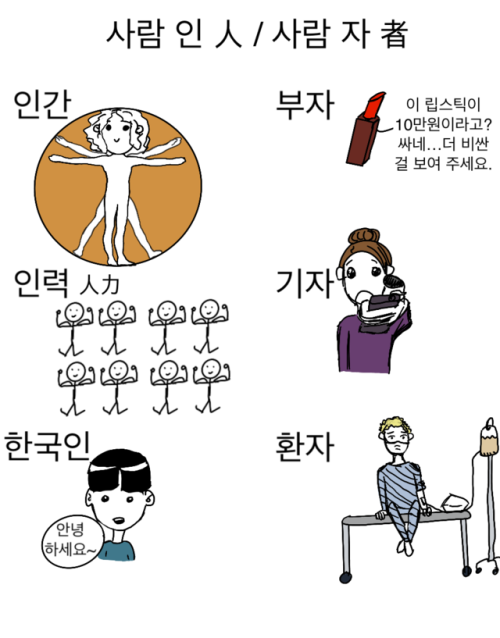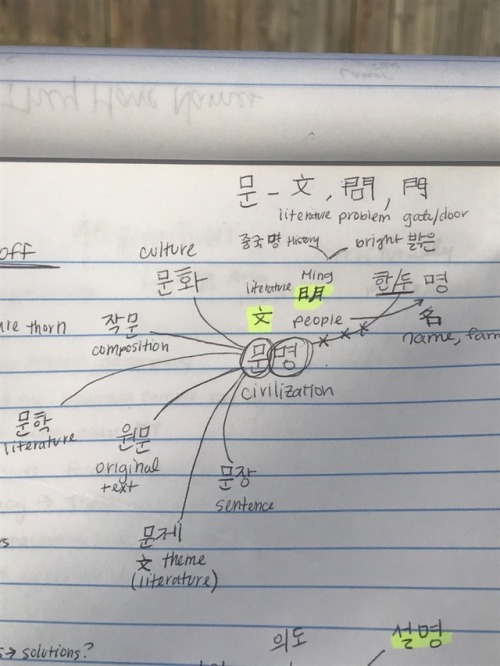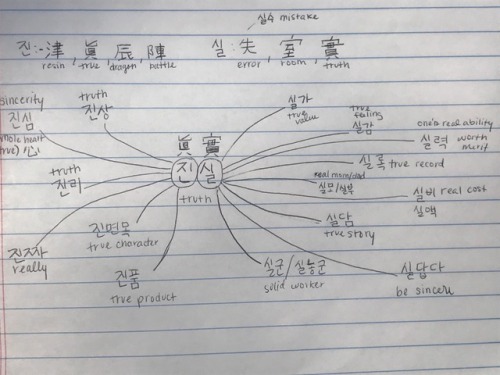#한자
수고스럽다 - 어떤 일을 하기에 힘이 들고 괴롭다 / to be troublesome
막상- 전에 생각한 것과는 다르게 실제로 닥쳐 보니 / in reality
우선순위- order of priority
형사 (刑事) - detective, investigator
안녕하세요 여러분! Hey everyone! I have another Hanja lesson for y’all today – this one is about two possible meanings of 악! I’m planning on posting this to my Instagramtomorrow as well, so be sure to follow me there for more Korean content! I hope this is helpful, and you can let me know if you have any questions! 화이팅!
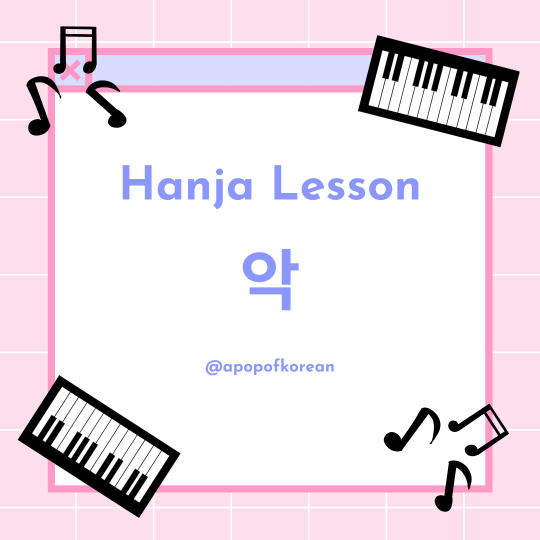
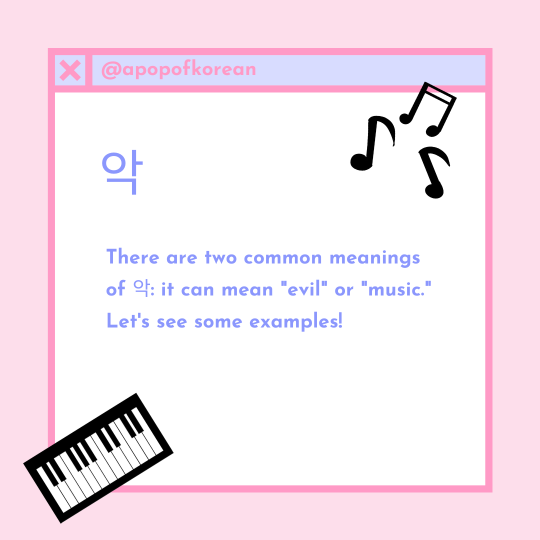
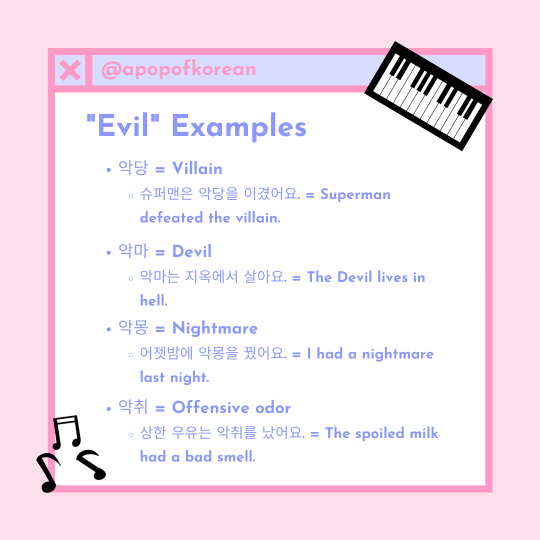
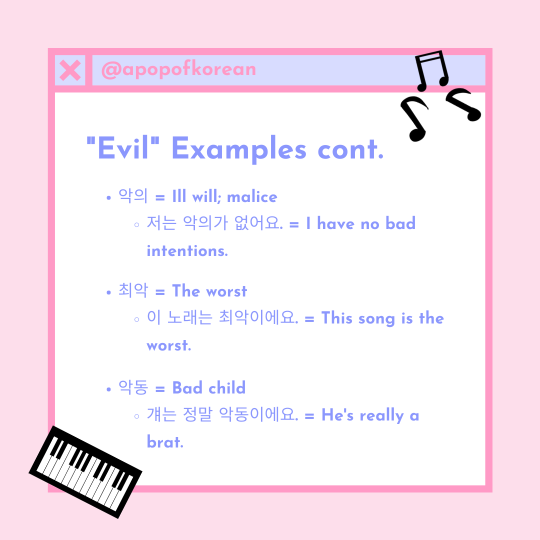


- My masterlist
- Joinmy Discord chat here to practice Korean with others!
- Follow me onInstagram herefor more Korean content!
- GetDrops Premium usingmy affiliate linkto expand your Korean vocab!
- Check out myKo-Fi to support this blog and my studies! Thank you for your generosity!
안녕하세요 여러분! I have another Hanja lesson for y’all – this one is about 수! This lesson doesn’t list every single possible meaning of 수, but these are some common ones. You can find this post on my Instagram as well; be sure to follow me there for more Korean content! I hope this is helpful!


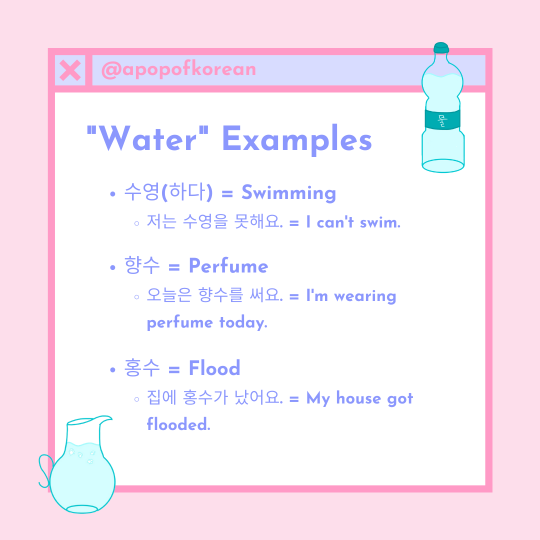


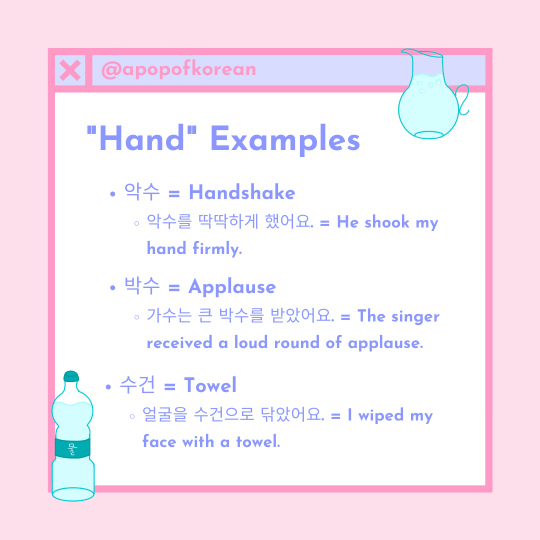
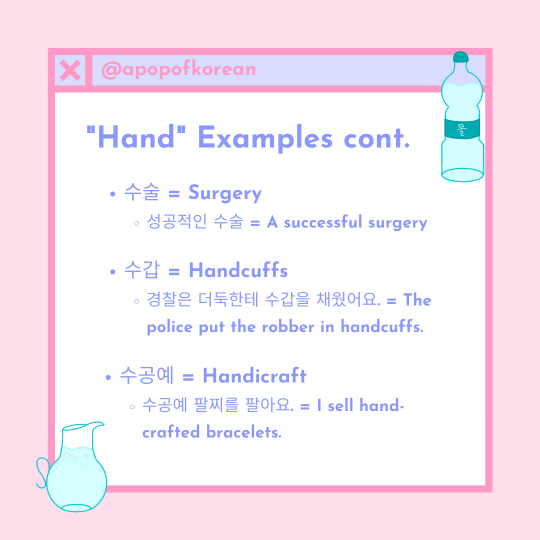

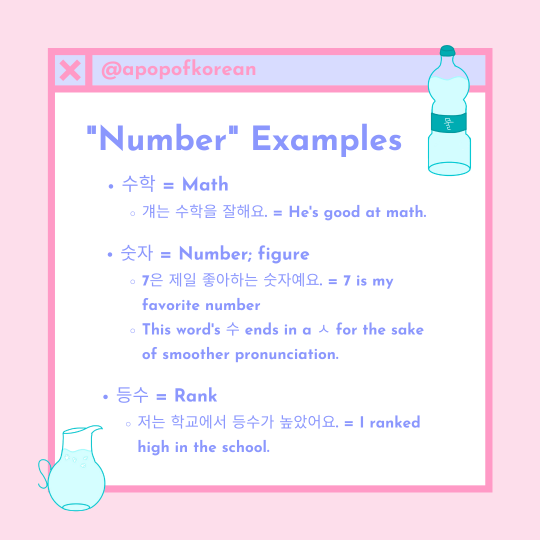
- My masterlist
- Joinmy Discord chat here to practice Korean with others!
- Follow me onInstagram herefor more Korean content!
- GetDrops Premium usingmy affiliate link to expand your Korean vocab!
- Check out myKo-Fito support this blog and my studies! Thank you for your generosity!
Today, I thought we should add a new hanja to the list: 力 - 힘 력/역. So, 力 means 힘 (power) and it is pronounced as 력(역 when it’s at the beginning of a word - but that is less common). 력 is a very common hanja in Korean. So, it’s great to be able to recognize it when words have something to do with strength, power or ability (strength to do something).
Here are common words seen with 力(힘 력/역).
집중력 ability to focus / 기억력 memory (ability to remember) 노력 effort (strength to put in effort, try, work) / 폭력 violence / 권력 power, authority / 능력 capability (power to be able to something) / 협력 cooperation (ability to work together) / 매력 charm (power to captivate, charm someone) /실력 ability (power of a skill) / 체력 strength, stamina (strength of the body) / 창의력 creativity (ability to be creative) / 중력 gravity /시력 eyesight (strength of the eyes) / 이해력 ability to understand something
Here are some example sentences.
우와 10년 전에 일어난 일을 그렇게 잘 기억해? 기억력이 대단하네. Wow, you can remember that thing that happened ten years ago that well? Your memory is amazing.
노력하면 다 잘 될 거야. If you try(put in effort), it will all work out.
그 여자는 매력적이에요. That woman is really charming.
어제 밤에 클럽 가고 나서 오늘 아침에 출근했다고? 헐 니 체력이 쩔어 ㅋㅋ You went to work this morning after going to a club last night?
우리 언니는 이해력이 좋아서 어려운 시험 문제를 쉽게 풀 수 있어요. My older sister’s ability to understand things is really good, so she can easily solve difficult test problems.
능력 and 실력 are two words that often confuse people since they can both be translated to ability or capability. They are quite similar, but still different. 능력 can be seen as an ability a little more innate or something that you’re born with, while 실력 is something you can improve or aquire. Which is why 능력 is normally used with 있다 and 없다 because you either have it or you don’t. But, 실력 can be used with words like 좋다, 나쁘다, 있다 and 없다. Because you can also acquire skills if you put in effort.
우리 팀장님은 진짜 능력이 있으세요. 실수 한번도 하신 적 없어요. Our team manager is really capable. She has never even made one mistake.
요즘 너 한국어 실력이 진짜 좋아지고 있는 것 같아. These days it seems like your Korean skills are really improving.
And do you remember the hanja 없을 무? 무 can be added to the word 중력 (gravity) to become 무중력 (zero gravity).
Next time you see 력 in a vocabulary word, ask yourself if it has anything to do with strength or power. Even take a moment to look it up! Hanja often helps me understand the true meaning of different vocabulary and remember them better. So, I hope it helps you too!
Good luck studying.
Follow me for more Korean tips and lessons~ and content.^^
Post link
Hi guys~ I’ve mentioned before that learning hanja is a great way to expand your vocabulary and also to understand vocabulary on a deeper level. Today, I have two different hanja that are used to represent the word “사람” or “person.”
The first one is 사람 인 人.
인간 human / 타인 other person, stranger / 성인 (adult person) adult
인재 talented person (재 for 소질 talent, aptitude for / 재능 talent)
한국인 Korean (person) / 외국인 foreign person / 인구 (인 person, 구 mouth - like the number of mouths to feed) population / 애인 (애 love, 인 person) lover, boy/girlfriend
If you remember learning 힘 력 力 (power), then you can use that to understand the word 인력 人力 (manpower). It’s often seen in the work force as 인력 필요하다 to need people to work/manpower.
There is also 사람 자 者.
부자 rich person *So in the picture with the lipstick, the person says “이 립스틱이 십만원이라고? 싸네…더 비싼 걸 보여 주세요. This lipstick is 100,000 won? (about 100 US dollars) That’s cheap…please show me a more expensive one.
환자 patient / 소비자 consumer / 피해자 victim / 노동자 (노동 labor 자 person) laborer
희생자 victim (“희생 sacrifice 자 person”) / 기자 newspaper journalist
약자 weak person (typically used to refer to women, children, and the elderly)
범죄자 (crime person) criminal / (비)흡연자 (non)smoker (lit: (비 not) 흡 taking in/drinking 연 smoke 자 person)
Don’t worry about the difference between 사람 인 and 사람 자. These are just the hanja that appear in vocabulary words. There is no “difference,” but you cannot change them. It’s impossible to change 한국인 to 한국자. You have to use 한국인.
Good luck studying everyone! Follow me for more Korean lessons.
Post link
漢字 (한자 - Hanja) 3
日 = 일 (날 일): day

- 내日 (내일)= tomorrow
- 매日 (매일)= everyday
- 日상 (일상)= daily life
- 日본 (일본)= Japan
- 日요日 (일요일)= Sunday
月 = 월 (달 월): month

- 月세 (월세)= (monthly) rent
- 매月 (매월)= every month
- 세月 (세월)= time
- 月요日 (월요일)= Monday
- 1月 (1월)= January
年 = 년 (해 년): year

- 작年 (작년)= last year
- 내年 (내년)= next year
- 매年 (매년)= every year
- 금年 (금년)= this year
- 학年 (학년)= a grade in school (1st grade, 2nd grade, etc..)
內 = 내 (안 내): inside

- 실內 (실내)= inside a place
- 국內 (국내)= inside a country
- 內부 (내부)= the interior part
外 = 외 (바깔 외): outside

- 外국 (외국)= foreign (outside country)
- 外국인 (외국인)= foreigner
- 제外하다 (제외하다)= except
- 해外 (해외)= foreign country
- 外出하다 (외출하다)= to leave
Happy learning! ^^
Source: How to study Korean - Hanja

漢字 (한자 - Hanja) 2
Link to page (unit 1)
入 = 입 (들 입): enter/entrance

- 入구 (입구)= entrance
- 入장하다 (입장하다)= to enter
- 수入하다 (수입하다)= to import
出 = 출 (날 출): exit, to exit

- 出구 (출구)= exit
- 出산 (출산)= childbirth
- 出국하다 (출국하다)= to leave a country
- 외出하다 (외출하다)= to go out/leave
口 = 구 (입구): mouth, opening

- 入口 (입구)= entrance
- 出口 (출구)= exit
- 出入口 (출입구)= entrance/exit
上 = 상 (위 상): above, high

- 천上 (천상)= heaven
- 지上 (지상)= above ground
- 上체 (상체)= upper body
- 上반기 (상반기)= the first half
下 = 하 (아래 하): underneath, below, low

- 천下 (천하)= the world/earth
- 지下 (지하)= underground
- 下체 (하체)= lower body
- 下반기 (하반기)= the second half
Happy learning! ^^
Source: How to study Korean - Hanja

Learn Korean with BTS! Series
- Weverse video series
- Classes based on the books (youtube and weverse)
- The BTS Recipe notes
- The BTS Fashion notes
Happy learning!! ^^

漢字 (한자 - Hanja) 1
Link to page (unit 1)
大 = 대 (큰 대): big

common words:
- 大학교 (대학교) = university
- 확大하다 (확대하다)= to expand, zoom
- 大통령 (대통령) = president
小 = 소 (작을 소): small

common words:
- 小규모 (소규모) = small scale
- 축小하다 (축소하다) = to minimize
- 小인 (소인) = a child (small person)
中 = 중 (가운데 중): middle

common words:
- 中국 (중국) = China
- 中학교 (중학교) = middle school
- 中앙 (중앙)= the center/middle
- 中급 (중급) = intermediate/mid-level
These 3 characters can be used, for example in prices:
- 小 1950 원
- 中 2500 원
- 大4000 원
山 = 산 (뫼 산): mountain

common words:
- 설악山 (설악산) = Seolak mountain
- 북한山 (북한산) = Bukhan mountain
- 부山 (부산)= Busan
門 = 문 (문 문) door

common words:
- 門 (문) = door
- 창門 (창문) = window
- 동大門 (동대문) = Dongdaemun (big east door/gate)
- 남大門 (남대문) = Namdaemun (big south door/gate)
- 광화門 (광화문) = Gwanghwamun
Happy learning! ^^
Source: How to study Korean - Hanja

Hello again, everyone! I’m slowly making progress digitizing my Hanja cards into an Anki deck. Today I have ver.2 of the set for you, which includes 8급 just like the last set, and 7급II. I also edited the image for one of the 8급 cards because, when reviewing, I realized that I had written it incorrectly! Oops!
Anyway, here’s the set! Just click here, download the set, and import it into Anki
Each of the levels is individually tagged in the overall deck, so if you just want to isolate one of the levels, you should be able to do so fairly easily.
If you want more information about the fields on the cards, you can read the first flashcard post here.
Please do tell me if you find any errors on any of the cards so I can update the set ASAP.
As always, happy studying!
Hello everyone! I’ve been keeping up with my Korean and Mandarin study, and generally keeping busy in this last month of the year.
As the title of this post suggests, I have some flashcards for you all! I am slowly digitizing my paper hanja cards into an Anki deck, and I want to share it with you guys. So far, I have only added my 8급 cards to the deck.
The current deck can be found by clicking this sentence!
I imagine that it will take quite a while to finish digitizing my complete sets. Here are all of the hanja cards I have made so far:

As you can see… I have a lot of cards! When I completely add a new level (next one is 7급II, of course) I will share the deck again.
Now a little info about the cards:
Each card has four fields, two of which are hidden until you click to open them. The main fields are the front field, which has the 훈음 (character meaning and reading); and the back field, which has a photo of the paper card I made. I marked stroke order when I wrote the cards, so there’s that!
The first of the two special fields is “Extra Information”, which has info about what level the character is in both reading and writing, and the radical. This field can be revealed by clicking a link on the front side. The second special field is “Sample words”, which shows words that use that character written out in hanja only. This can be accessed from the back side of the card.
Each card has a normal and reverse, so there are 100 cards in the current deck to represent the 50 8급 hanja.
I hope some of you find this useful! Please let me know if you do :)
As always, happy studying~
Welcome to another 漢字 배우자! post~ It’s been a while, hasn’t it? Today, I want to take a look at a character that is really common, 가운데 중. Meaning “middle” or “center,” you can see it on, of example, menus indicating the medium size of a dish. It is also a component of a lot of words. Let’s check out some of those words and how the character contributes to their meanings.

If you have read the past 漢字 배우자!, you will already be somewhat familiar with 가운데 중 中. We first saw it when we talked about Hanja in country names—in this case, China or 중국 中國. However, we did not dive into how it is used in other words. Some common words that use 가운데 중 中 are:
집중 集中
집중, meaning “concentration,” is made of 모을 (to gather, collect) 집 集 and 가운데 中. If you are collecting or gathering everything to the middle, then you end up directing everything to one point. This can be mentally concentrating or focusing on something, directing one thing toward another.
아리 씨는 불만을 직원에게 집중했다. (Ari focused her dissatisfaction on the employee.)
2시간 동안 열심히 집중해서 에세이를 썼다. (I concentrated hard for two hours and wrote my essay.)
중심 中心
A combination of 가운데 中 and 마음 (heart) 심 心, 중심 中心 can be translated as the heart or center of something. This can be the heart of a city, the heart of a matter, or really just about anything else as long as it is considered the most central or important part.
김 교수님은 우리 팀의 중심이다. (Professor Kim is the heart of our team.)
동네의중심인 주민센터는 매월 다양한 행사를 한다. (The community center, which is the heart of the neighborhood, has various events every months.)
중간 中間
With 가운데 中 and 사이 (space) 간 間, we get a word that refers to physical or temporal middle point.
우리는중간까지 와서 돌아가기에 너무 늦었다. (We’ve come halfway, so it’s too late to go back.)
영화중간에 가 버리면 표 값이 아깝지 않나요? (If you leave in the middle of the movie, isn’t that a waste of the ticket cost?)
중지 中止
Comprised of the characters 가운데 中 and 그칠 (to stop) 지 止, 중지 means “stopping in the middle of something.”
비가 갑자기 쏟아내려서 경기가 중지되었다. (It suddenly poured down rain, so the match was stopped.)
주변에 싱크홀 3개가 생겨서 석유 시추가 중지되었다. (The oil drilling was suspended because three sinkholes appeared in the area.)
중지 中指
Of course we have 가운데 中, and the second character here is 가리킬 (to point out) 지 指. Very simply, this word means “middle finger”!
선생님은 수업 시간 동안 반친구에게 중지를 뻗어 올린 학생을 혼냈다. (The teacher scolded the student who put up his middle finger toward a classmate during class.)

As always, happy studying!
I was sitting with my friend bored, and we decided that there are somethings in English that we cannot translate into Korean. So we sat down and had a long think about it.
Pronunciation of difficult slang is in [발음] :)
please re blog this because NO KOREAN uses this yet! Actually NO KOREAN except for my closest friends use this slang so please please share with your Korean friends too! I would like to see AOA use the phrase 큐섹! :)
Here are the new slang!
Cute and sexy -큐섹하다 큐트(귀엽다) + 섹시하다 (to be sexy)
Adj: 큐섹한 Adv: 큐섹하게 Noun: 큐섹함
e.g 오늘은 큐섹한 원피스를 샀어요.
큐못남 [큐몬남]- Cute but Ugly boy (귀엽다+못생긴 + 남자)
큐못녀 [큐몬녀] - Cut but ugly girl (귀엽다+못생긴 + 여자)
큐핫남 [큐한남] - Cute and sexy boy (귀엽다 + 핫 (완전 섹시한) 남자)
큐핫녀 [큐한녀] - Cute and sexy girl (귀엽다 + 핫 (완전 섹시한) 여자)
섹똑하다 - Sexy and smart (섹시하다 + 똑똑하다)
배피다 - To be hungry and tired (배고프다 + 피곤하다)
온괴자 - A cyber bully (온라인 + 괴롭히다)
온괴하다 - To cyber bully (온라인 + 괴롭히다)
늦온남 /늦온녀 - Someone who comes online late and makes bad excuses (늦게 + 온라인 + 남/녀)
늦온되다 - To be late online and start making excuses
라소되지 - A greedy person who eats just ramen and soju all day (라면+소주+되지)
라소먹다 - To eat ramen with soju (라면 + 소주 + 먹다)
헤어진크림 먹다 - to eat at icecream after a break up (헤어지다 + 아이스크림 +먹다)
듣싫노래 [듣실노래] A song that is on your playlist that you no longer listen to.
(듣기 싫다 + 노래)
영대왕 - Someone who speaks English like a native (영어 + 대왕)
한대왕 - Someone who speaks Korean like a native (한국어 + 대왕)
노대왕 - Someone who sings really well (노래 + 대왕)
게임대왕 - Someone who has amazing gaming skills (게임+대왕)
한쁜억 - Someone who speaks Korean with a bad accent (한국 + 나쁜 + 억양)
한잘억 - Someone who speaks Korean with a good accent (한국+ 잘 + 억양)
한원남/ 녀 - A guy/girl who wants to be Korean (한국 + 원나비 (되고 싶은) +남/녀)
일원남/녀 can also be used
케중남/녀 - A guy/girl who is addicted to K-pop (케이팝 + 중독 + 남/녀)
메중녀/남 - A girl/guy who is addicted to makeup (메이컵 +중독 +남/녀
싫걸남친 [실걸람친] - A boyfriend who does the things that his girlfriend hates (싫어하는걸+남자 친구)
싫걸여친[실걸려친] - A girlfriend who does the things that her boyfriend hates (싫어하는걸 + 여친)
여친못하다 -To not understand your girlfriend (여자친구 + 못하다)
남친못하다 - To not understand your boyfriend (남자친구+못하다)
첨만얼- someone’s face that you meet the first time(처음 만난 + 얼굴)
첨만얼 보다 - To see someone’s face for the first time.( 처음 만난 얼굴 + 보다)
악데몽[앙데몽] - A really bad date (악몽+ 데이트 = 악(데이트)몽)
좋데꿈 - A really nice / amazing date (좋은 꿈 + 데이트 = 좋(데이트)꿈)
쌤개 - Teachers pet (선생님 + 개)
불합남/녀[불함남/녀] - A boy/girl with the lowest grades (불합격하다 + 남/녀)
짱님 - The best teacher (선생님+짱)
숙까먹다 - To forget your homework (숙제+까먹다)
비커플 - A couple who are dating secretly (비밀+커플)
몰연애하다 - to date secretly (몰래+연애하다)
빌애인 [비래인] - Secret lover (비밀+애인)
올친지애 - A lover who you were friends with for a long time before you dated them, and have just started dating them today. ( 오랫동안 + 친구 + 지금+ 애인)
속어들은 많이 이용하시길 바랍니다. We hope you use these slang words al ot !
속어는 강태빈(Christian Kmachni)과 구아영 (Eden Nkukulu)에 의해 복제되었다.




